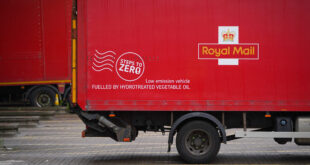Media playback is unsupported on your device
This election has seen the issue of broadband rise up the agenda in a way it has not in previous campaigns.
A reliable internet connection is something many in urban parts of Wales take for granted.
Search central Cardiff addresses for broadband availability and you will see a list of services ranging up to 500 megabits per second (Mbps).
Try Alexander Velky’s idyllic home in Preseli Pembrokeshire and it is a different story.
One site says the wires to his home can only support one Mbps – it’s been a long time since that was top-of-the-range.
The question of how to fix the service for people like him is the subject of competing policies from the political parties as they compete for votes in the general election on 12 December.
Mr Velky, a copywriter and community manager, used to work from home easily.
But since he moved house two years ago, the connection means he cannot reliably work from there.
A satellite connection works better, but he still has problems with delays and the amount of data he and his family can use.
To install full-fibre internet would cost him at least £30,000.
His home is idyllic but tricky to run a business from
“For a small business like us, where its me and my wife, it’s just not workable,” he said.
His wife sometimes resorts to working from a public library.
“We are now at a point where homes in the countryside are in danger of not becoming fit for purpose in the 21st Century,” Mr Velky said.
Homes in his area that were not set up for electricity from the National Grid in the 1960s went out of use, he said.
“I worry the same could possibly be the case for those that don’t get proper broadband,” he said.
Josh Wright is a business partner at Pembrokeshire Sea Salt
Meanwhile Josh Wright, a business partner at Pembrokeshire Sea Salt, said it was well connected – off the road between Newport and Fishguard.
But the same cannot be said for his internet access – he has regular problems with the time it takes to upload and download documents from the cloud.
It can be frustrating, he said: “You might have to keep refreshing the page over and over again because it keeps losing connection to the server.
“It’s crazy, it really is. Some of the places I’ve been around the world they have a much better signal, phone signal, whatever it might be, than we do here.
“You’d expect it to be much better, even in rural Wales.”
The firm is well connected off the road between Newport and Fishguard
The regulation of telecoms is in the control of Westminster politicians, although the Welsh Government has funded improvements through the now-finished £200m Superfast Cymru scheme, to around 733,000 premises, with the help of EU and UK government cash.
It did not go everywhere and a successor scheme for 88,000 premises was set-up. But it is only reaching 26,000 as it stands.
Lee Waters, deputy economy minister, told a Senedd debate in May the market was “not interested” in public subsidy to link up those places yet to be reached. The Welsh Government says it is talking to Openreach about extending the number of premises, and is creating a £10m fund for “innovative” solutions to get the last 5% offline in Wales online.
A total of 375 properties are to benefit from the new scheme in Pembrokeshire, on top of the 59,000 that saw Superfast broadband under the older scheme.
Ofcom figures from December 2018 show 9% of premises in Preseli Pembrokeshire constituency could not receive 10Mbps or more.
ThinkBroadband put the figure for premises that could get up to 30Mbps at 86.2%.
What do the political parties say?
Labour has pledged a £20bn plan for free fibre broadband for all by 2030.
It wants to nationalise the BT-owned infrastructure firm Openreach, rolling out the service to areas worst served first and funding it through a tax on tech multinationals.
Philippa Thompson, the party’s candidate for Preseli Pembrokeshire, said: “It’s such an important utility for everyone these days – it’s part of how we now do things.”
She said the Labour plan would “help rural communities like here in Pembrokeshire”.
It would be like Royal Mail, she explained: “However distant you are – you still get your post. For me it’s along those lines.”
Ms Thompson is looking to unseat Conservative incumbent Stephen Crabb.
His party has promised to spend £5bn to support broadband rollout, providing “bespoke solutions to the 20% hardest-to-reach areas”.
The party’s manifesto promises “full fibre and gigabit-capable broadband to every home and business across the UK by 2025”.
Mr Crabb said telling constituents there had been an 86% rollout of “superfast” did little to soothe those who did not have it.
“If you’re one of those households who has been told by Openreach engineers you can’t get it, it’s no good telling them 86% of households can get it, it might as well be 0%,” Mr Crabb said.
He said £5bn was a “realistic programme of action” and claimed the Labour policy was “not credible”.
Other challengers in the constituency include Plaid Cymru’s Cris Tomos.
His party has proposed a publicly-owned Welsh broadband infrastructure company to guarantee access to full-fibre broadband to every home and business in Wales by 2025.
“In every situation there are different difficulties, be they terrain, be they rivers or the rock in the ground that has to be penetrated to put down cables,” Mr Tomos said.
“It’s actually looking at each solution for each community.”
The Liberal Democrats, whose candidate Thomas Hughes was not available for interview, have promised a “programme of installing hyper-fast, fibre-optic broadband across the UK – with a particular focus on connecting rural areas”.
The party says it would invest £2bn in “to ensure the provision of high-speed broadband across the UK” working with councils and providing grants to help areas replicate the success of existing community-led projects.
Source link



